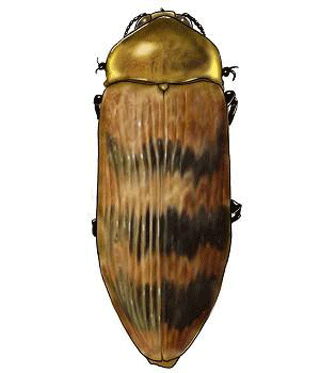
|
Published: 25 June 2012
Beetles find beer bottles irresistible
Why are male beetles in Western Australia mating with beer bottles? A new book, Behavioural Responses to a Changing World, explains this and other behavioural responses to environmental change caused by human activity.

|
|
The blackbanded jewel beetle. Jewel beetles in Western Australia are mistaking discarded beer bottles for female beetles and mating with them, often dying in the hot sun in the process. Credit:
CSIRO
|
Drawing on international experts in biology and evolutionary ecology, Behavioural Responses to a Changing World emphasises the vital links between environmental change, behaviour and animal population dynamics.
‘Due to human activities, almost all creatures live in environments that have been altered to some degree. The ability to behave accordingly under new conditions is crucial for survival,’ says co-editor Dr Bob Wong of Monash University’s School of Biological Sciences.
‘Environmental change caused by human activity is considered the greatest single threat to global biodiversity. Scientists are only now beginning to appreciate the important ecological and evolutionary implications of altered behaviours due to environmental change.’
According to Dr Wong, the initial response of many animals to human-induced environmental change is often behavioural, and this in turn affects species’ interactions, population viability, evolution, and ultimately, biodiversity.
‘Some of these behaviours can be beneficial and buy more time for populations and species to genetically adapt to altered conditions. Some species might even thrive in urban environments. But behaviours can also be maladaptive,’ says Dr Wong.
‘For example, researchers from Canada and Australia have reported that male beetles in western Australia are being attracted to brown beer bottles left behind in the bush. The colour, shine and bumps on the bottles resemble those of female beetles and act as a super normal stimulus,’ says Dr Wong.
‘This is potentially bad news for the species because, instead of mating with real females, males are wasting their time trying to copulate with the beer bottles.’
The study, carried out in the 1980s, received quite a bit of renewed interest last year because it won the researchers an Ig nobel prize but, on the serious side, there are important ecological and evolutionary implications.’
In another example discussed in the book, a study conducted in Mexico found that two species of swordtail fish have started to hybridise with each other. The researchers showed that this was likely due to pollution in the water interfering with the ability of females to identify males of their own species based on smell.
Source: Monash University



